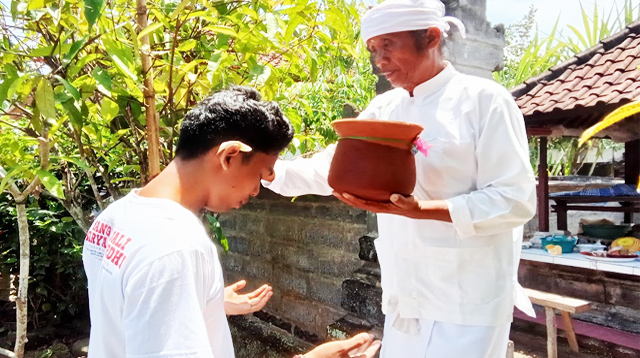NESTLED in the heart of the Indonesian archipelago, Bali is renowned for its breathtaking vibrant culture and unique spiritual traditions. One of these traditions, which has been practiced for centuries, is known as “Melukat” – a sacred Balinese ritual of self-purification.
Melukat, also sometimes spelled as Melukat, holds a special place in the hearts of Balinese people and continues to be an essential part of their spiritual lives. In this article, we will explore the significance, procedures, and cultural aspects of Melukat in Bali.
The Essence of Melukat
Melukat is deeply rooted in Balinese Hinduism, and it is a vital element of the island’s unique religious and cultural heritage. The central idea behind Melukat is to cleanse the body, mind, and soul from impurities and negative influences, promoting spiritual and physical well-being. This purification ritual plays a crucial role in maintaining harmony and balance in an individual’s life.
The Melukat Process
Melukat is a complex and highly symbolic ritual, often guided by a temple priest or “pemangku.” It involves a series of intricate measures and offerings. Here is an overview of the process:
Preparation: Before the Melukat ritual, participants must purify themselves by fasting and abstaining from certain activities, such as alcohol and smoking. This preparation is essential to achieve a state of spiritual purity. Other prohibitions may be told your guide or the organizer.
Holy Water: Central to the Melukat ritual is the use of holy water, which is believed to possess strong spiritual and cleansing properties. The holy water is prepared by the priest and is typically derived from a sacred spring or temple. The water is blessed and charged with powerful energy.
Offerings: Various offerings are presented to the deities, which may include flowers, fruits, incense, and rice. These offerings are intended to honor the gods and goddesses and seek their blessings.
Prayers and Chanting: The priest leads the participants in chanting prayers, mantras, and hymns, invoking the divine to cleanse and purify their souls.
Water Cleansing: The central act of Melukat involves participants submerging or showering themselves in the holy water. This immersion signifies the purification of the body and soul. The priest often sprinkles holy water on the participants as well.
Closing Ritual: The Melukat ceremony concludes with final prayers and blessings, sealing the participants’ newfound state of spiritual purity.
Cultural Significance
Melukat is not just a religious practice; it is deeply intertwined with Balinese culture. Sometime with additional ritual, it is performed on various occasions, such as before major life events like weddings or important ceremonies.
It can be a part of traditional healing processes or post-hospitalization. When getting recovered and arriving home, patient’s family will provide self-purificatory rite because patient may have experienced stress and unstable emotional condition while pre- and post-treatment and aura of impurities because many unexpected events were seen at hospital, including seeing dead patients pushed by nurses to mortuary. At least, it is expected to help restore and re-purify the soul and mind.
Similarly, melukat ritual is believed to protect against negative forces and ensure prosperity. Thus people can live their life in their purity of soul.
The ritual of Melukat is a communal activity, reinforcing the sense of community and social ties among the Balinese people. It connects individuals with their ancestors, deities, and the natural world, fostering a profound sense of belonging and unity. This can be a family temple, house of Brahmin priest, sacred bathing place of public temples or Beji Temple or the beach.
Preserving Tradition in Modern Times
While Bali has experienced significant modernization and an influx of tourists, the practice of Melukat remains a vibrant part of daily life for the local population. Balinese people are committed to preserving their cultural heritage, and Melukat plays a vital role in that mission.
In the face of rapid change, Melukat serves as a reminder of Bali’s rich cultural history and the enduring significance of spiritual practices in contemporary life. Visitors to Bali often have the opportunity to witness and, in some cases, participate in Melukat ceremonies, offering them a glimpse into the island’s captivating traditions.
Melukat, the ancient art of self-purification in Bali, is more than just a religious ritual; it is a cornerstone of Balinese culture, connecting individuals with their spirituality and heritage. Through the process of purification and renewal, Melukat offers a sense of solace, balance, and a profound connection to the divine. As Bali continues to evolve in the 21st century, the practice of Melukat reminds us of the enduring power of tradition and the importance of spiritual well-being in our lives.










